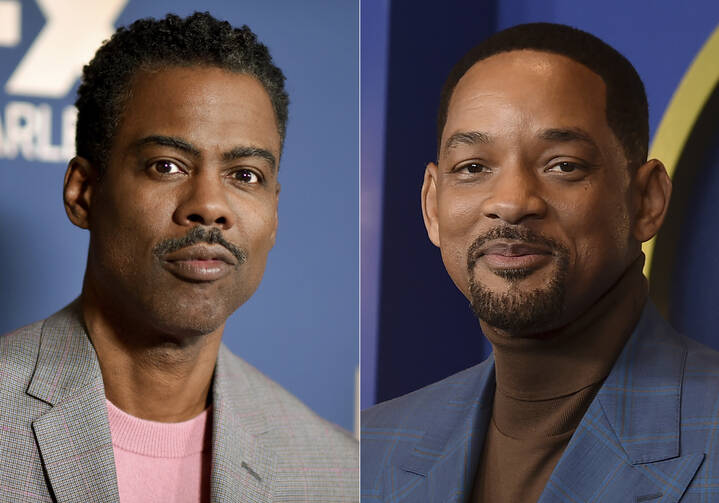Like many Oscars viewers, when Will Smith first stepped onto the stage at Hollywood’s Dolby Theater and slapped Chris Rock, I assumed that I was witnessing a scripted stunt. Then I thought I was dreaming. As the reality set in, I grew troubled, in part because as a Black man I didn’t like two icons of our community being seen in an unfavorable light nationally.
Smith’s reaction and follow-up actions illustrate what happens when we don’t have spiritual discernment and when we do. His initial anger upon hearing Rock’s joke about his wife Jada Pinkett Smith’s shaved head (Pinkett Smith has alopecia) came out of his love for and desire to protect her. Yet in the moment, he reacted out of impulse rather than taking some steps back and discerning whether that overtly aggressive act served anyone—most especially himself and his wife—well.
Immediately after the event, Denzel Washington—a graduate of Fordham, a Jesuit university—told Smith to “be careful” about acting out of impulse like this. “At your highest moment...that’s when the devil comes for you,” he said.
Will Smith slapped Chris Rock in a moment of passionate anger. Here’s what he could have done differently, according to St. Ignatius.
In his Spiritual Exercises, St. Ignatius similarly warns us to remain on guard and “to pay attention to the voice of the evil spirit in our lives.” But is there really an invisible ghost capable of leading us off a path of goodness to another that panders to our most unfortunate human reactions? How can we better see its presence and understand the possible consequences when strong feelings overcome us?
For Ignatius, there is both a good spirit and an evil one. And when he talks in these terms, he is not imagining a magical being or a ghost, but aspects of the self. The evil spirit protects and inflames our egos; it is the sense of self that acts without deep love for others. The good spirit fortifies all that is good and true in us. Where the evil spirit often pushes us toward selfishness and quick reactions, the good spirit asks, “What about love, faith and hope? Do you really need to make fun of someone? Do you really need to retaliate?”
Ignatius wasn’t the only one to talk about good and evil spirits in this way. In his letter to the Galatians, St. Paul said, “Live by the (good) Spirit, I say, and do not gratify the desires of the flesh. For what flesh desires is opposed to the spirit, and what the spirit desires is opposed to the flesh; for these are opposed to each other” (Gal 5:16-19).
Will Smith’s approach was egoistic. He reacted, as St. Paul describes, out of “the desires of the flesh.” When we are driven by instinct, we become the servant of our ego, which the spiritual writer Richard Rohr, O.F.M., appropriately calls the “small self.”
Where the evil spirit often pushes us toward selfishness and quick reactions, the good spirit asks, “Do you really need to retaliate?”
When the tables are turned and the ego is instead made our servant, we are able to proceed with a loving discernment on God’s time. We step back, look at the big picture and listen for God’s voice in us.
We all need to be in touch with our feelings and beware of taking action based on our instincts. In the heat of the moment, our inner voice can nag us about how we need to protect our family, our reputation, ourselves. But we must counter such impulses with questions: “What does God want me to do? Can I see God and his benevolence in this situation?” We need to look for inner direction from God that is based in benevolence and understanding. Had Smith done that, his actions would have been very different.
In talking about spirits, Ignatius invites us to be generous, courageous and indifferent—that is, detached from our natural instincts toward self-preservation, open to surrendering ourselves to God’s wisdom and letting him take control. Seeing how our ego-blind reactions blind us to the wisdom of God, he wants us to build a space within ourselves where we can discern God’s voice with true interior freedom before we act, so that we can hope in God when we feel threatened. The gift of discerning holy spirits from evil ones, good impulses from bad is within us all, he insists, if only we choose to accept it.








